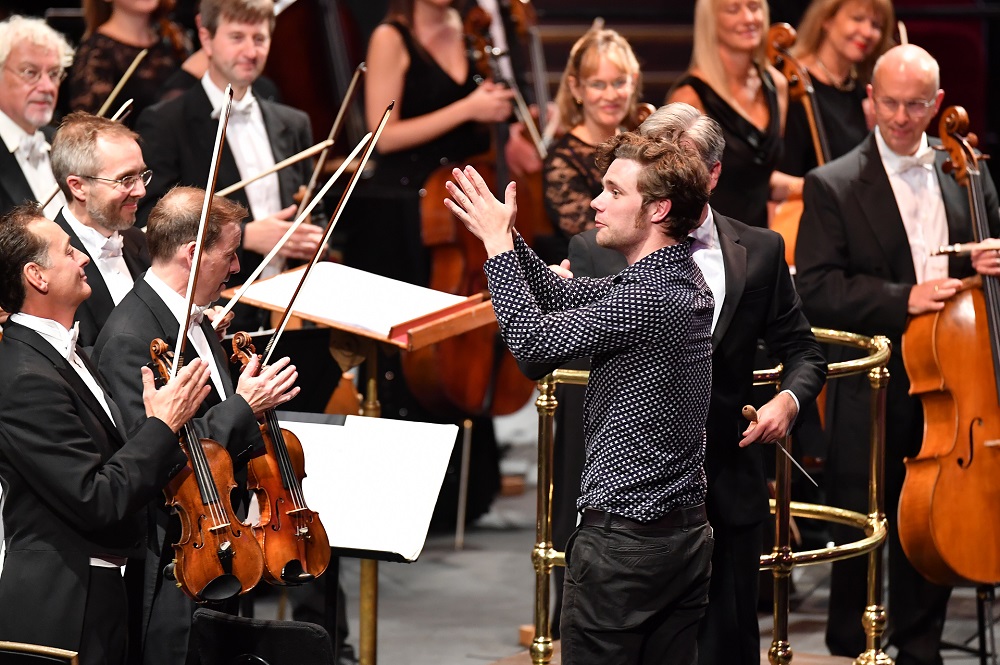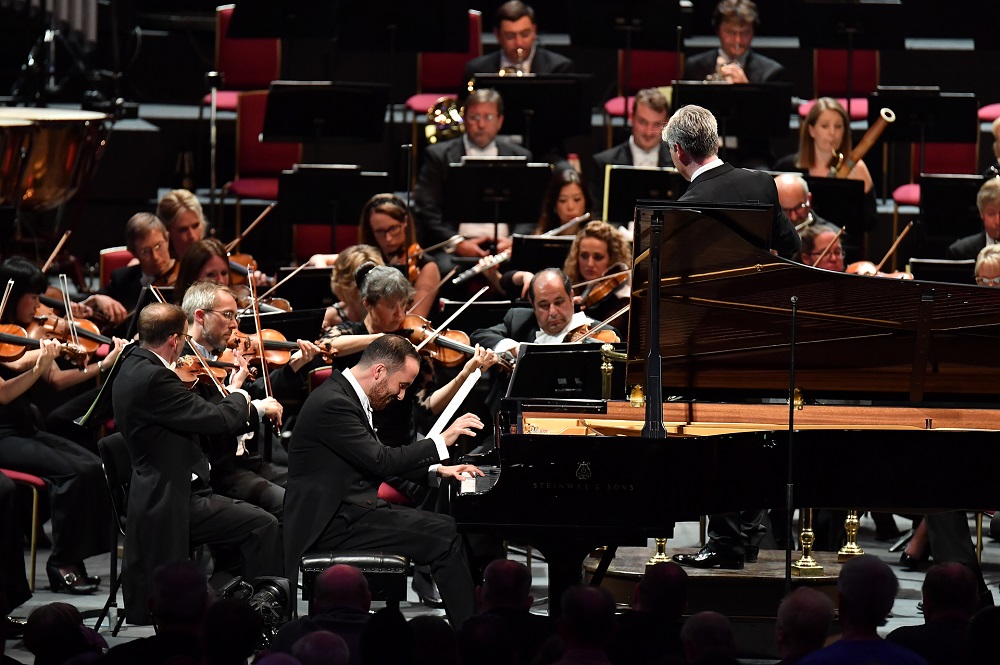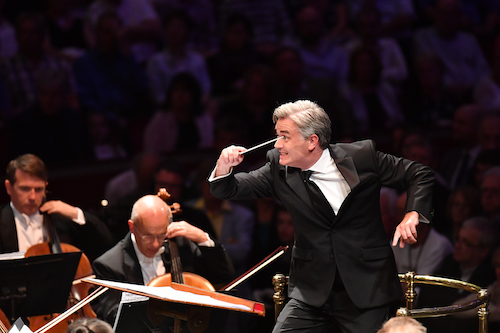Prom 1 review: Levit, BBCSO, Gardner - fizzing Adams finally ignites mixed First Night | reviews, news & interviews
Prom 1 review: Levit, BBCSO, Gardner - fizzing Adams finally ignites mixed First Night
Prom 1 review: Levit, BBCSO, Gardner - fizzing Adams finally ignites mixed First Night
Controlled premiere and subdued Beethoven redeemed by a choral blockbuster
The ideal First Night of the Proms sets the tone for the season, perhaps flagging up some of the themes to be followed up later, offering a blend of novelty and familiarity, and preferably ending with a roof-raising choral blockbuster. This programme successfully ticked those boxes, but took until the second half to really catch light.
Unlike last year, which took place under the shadow of a terrorist in France, the 2017 edition could be more straightforwardly celebratory. And unlike the Last Night, although there are First Night conventions, there was no danger of the tail of licensed foolery wagging the musical dog.
Igor Levit (pictured below) is a pianist of high reputation, and I was looking forward to hearing him live for the first time. In many ways I wasn’t disappointed by his rendition of Beethoven's third piano concerto: his playing was beautiful of tone, detailed and attuned to the character of the music. But I felt that he and the orchestra were sometimes on different pages. The orchestral opening was brisk and sharply defined dynamically. Levit’s playing, though, was more inward and contemplative. He made little accommodation to the size of the hall – the beginning of the second movement was nearly inaudible, just in the stalls – and he was sometimes outgunned by the band.
It may be that the majority of the rehearsal time was devoted to the other pieces, or it may be that this concerto – wonderful though it is – was not the right one for the occasion. Either way, for all the beauties to be found in Levit’s playing, the performance as a whole never quite took flight. Levit's encore was a treat: Liszt's arrangement of Beethoven's "Ode to Joy", a nose-thumb to Brexit if the pianist's social media reactions and his European Union lapel badge last night are anything to go by, had a wonderful shape and symphonic piano playing.
One of the many reasons to be grateful to the BBC Proms is for being able to stage events on this kind of scale. In addition to the large orchestra there were some 370 singers taking up all the seating behind the stage, a terrific sight all in black. This choir was made up of the stalwart BBC Symphony Chorus but also the BBC Proms Youth Choir, featuring young singers from around the country. The Proms Youth Choir Academy, in its pilot year, brings in singers from a wide range of musical backgrounds, embracing those without previous singing experience, and those who don’t read music.
The Adams is not an easy piece to get them started on, but the six months of rehearsal were clearly well spent, as the choral sound was feisty, with bite when it was needed, but also subtlety in the middle movement. Credit must go to the chorus masters responsible, and particularly to Grace Rossiter for stewarding the Youth Academy. In the concert, conductor Edward Gardner (pictured below) did a fine job keeping everyone together with a clear beat and impressive communication with the singers, some of whom were about 30 metres away. Harmonium is extraordinary for what it achieves by using some of the materials of “classic” minimalism, but imbuing them with a decidedly Romantic sensibility. The opening owes a lot to Steve Reich, but the music develops in what has become a distinctively Adamsian way, with nods to Stravinsky and Wagner. There is a notable absence of melody, the music moving through blocks of harmony and texture, with the words at times incidental to the sounds the choir and orchestra produce.
Harmonium is extraordinary for what it achieves by using some of the materials of “classic” minimalism, but imbuing them with a decidedly Romantic sensibility. The opening owes a lot to Steve Reich, but the music develops in what has become a distinctively Adamsian way, with nods to Stravinsky and Wagner. There is a notable absence of melody, the music moving through blocks of harmony and texture, with the words at times incidental to the sounds the choir and orchestra produce.
Undoubtedly the highlight is the transition into the final movement – “Wild Nights” – where a massive orchestral crescendo climaxes with an ecstatic harmonic shift into the entry of the choir. I can only imagine the thrill for the young singers involved at this moment, and can think of no better advert for the Proms.
Because for all that we may have gripes about the scheduling overlooking this or that composer, the vacuity of some of the TV presentation, or whatever else, last night was a reminder that the Proms are a vital element of our country’s cultural life, and should be loudly celebrated as such.
rating
Explore topics
Share this article
The future of Arts Journalism
You can stop theartsdesk.com closing!
We urgently need financing to survive. Our fundraising drive has thus far raised £49,000 but we need to reach £100,000 or we will be forced to close. Please contribute here: https://gofund.me/c3f6033d
And if you can forward this information to anyone who might assist, we’d be grateful.

Subscribe to theartsdesk.com
Thank you for continuing to read our work on theartsdesk.com. For unlimited access to every article in its entirety, including our archive of more than 15,000 pieces, we're asking for £5 per month or £40 per year. We feel it's a very good deal, and hope you do too.
To take a subscription now simply click here.
And if you're looking for that extra gift for a friend or family member, why not treat them to a theartsdesk.com gift subscription?
more Classical music
 Scottish Chamber Orchestra, Ibragimova, Queen’s Hall, Edinburgh review - rarities, novelties and drumrolls
A pity the SCO didn't pick a better showcase for a shining guest artist
Scottish Chamber Orchestra, Ibragimova, Queen’s Hall, Edinburgh review - rarities, novelties and drumrolls
A pity the SCO didn't pick a better showcase for a shining guest artist
 Kilsby, Parkes, Sinfonia of London, Wilson, Barbican review - string things zing and sing in expert hands
British masterpieces for strings plus other-worldly tenor and horn - and a muscular rarity
Kilsby, Parkes, Sinfonia of London, Wilson, Barbican review - string things zing and sing in expert hands
British masterpieces for strings plus other-worldly tenor and horn - and a muscular rarity
 From Historical to Hip-Hop, Classically Black Music Festival, Kings Place review - a cluster of impressive stars for the future
From quasi-Mozartian elegance to the gritty humour of a kitchen inspection
From Historical to Hip-Hop, Classically Black Music Festival, Kings Place review - a cluster of impressive stars for the future
From quasi-Mozartian elegance to the gritty humour of a kitchen inspection
 Shibe, LSO, Adès, Barbican review - gaudy and glorious new music alongside serene Sibelius
Adès’s passion makes persuasive case for the music he loves, both new and old
Shibe, LSO, Adès, Barbican review - gaudy and glorious new music alongside serene Sibelius
Adès’s passion makes persuasive case for the music he loves, both new and old
 Anja Mittermüller, Richard Fu, Wigmore Hall review - a glorious hall debut
The Austrian mezzo shines - at the age of 22
Anja Mittermüller, Richard Fu, Wigmore Hall review - a glorious hall debut
The Austrian mezzo shines - at the age of 22
 First Person: clarinettist Oliver Pashley on the new horizons of The Hermes Experiment's latest album
Compositions by members of this unusual quartet feature for the first time
First Person: clarinettist Oliver Pashley on the new horizons of The Hermes Experiment's latest album
Compositions by members of this unusual quartet feature for the first time
 Gesualdo Passione, Les Arts Florissants, Amala Dior Company, Barbican review - inspired collaboration excavates the music's humanity
At times it was like watching an anarchic religious procession
Gesualdo Passione, Les Arts Florissants, Amala Dior Company, Barbican review - inspired collaboration excavates the music's humanity
At times it was like watching an anarchic religious procession
 Classical CDs: Camels, concrete and cabaret
An influential American composer's 90th birthday box, plus British piano concertos and a father-and-son duo
Classical CDs: Camels, concrete and cabaret
An influential American composer's 90th birthday box, plus British piano concertos and a father-and-son duo
 Cockerham, Manchester Camerata, Sheen, Martin Harris Centre, Manchester review - re-enacting the dawn of modernism
Two UK premieres added to three miniatures from a seminal event of January 1914
Cockerham, Manchester Camerata, Sheen, Martin Harris Centre, Manchester review - re-enacting the dawn of modernism
Two UK premieres added to three miniatures from a seminal event of January 1914
 Kempf, Brno Philharmonic, Davies, Bridgewater Hall, Manchester review - European tradition meets American jazz
Bouncing Czechs enjoy their Gershwin and Brubeck alongside Janáček and Dvořák
Kempf, Brno Philharmonic, Davies, Bridgewater Hall, Manchester review - European tradition meets American jazz
Bouncing Czechs enjoy their Gershwin and Brubeck alongside Janáček and Dvořák
 Solomon, OAE, Butt, QEH review - daft Biblical whitewashing with great choruses
Even a top soprano and mezzo can’t make this Handel paean wholly convincing
Solomon, OAE, Butt, QEH review - daft Biblical whitewashing with great choruses
Even a top soprano and mezzo can’t make this Handel paean wholly convincing
 Two-Piano Gala, Kings Place review - shining constellations
London Piano Festival curators and illustrious friends entertain and enlighten
Two-Piano Gala, Kings Place review - shining constellations
London Piano Festival curators and illustrious friends entertain and enlighten

Add comment